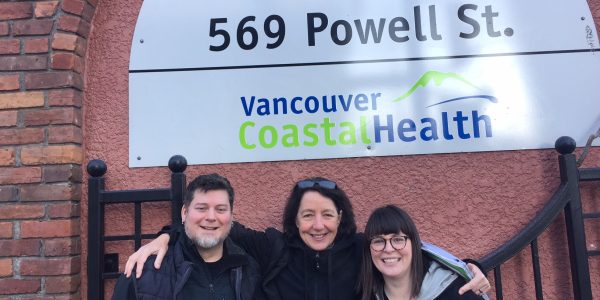Interim Opioid Replacement Therapy now available for rapid starts
Downtown CHC expands services to support Second Generation Strategy
“Our clients are finding us in their search for Opioid Replacement Therapy, and in this time of overdose crisis, we are taking fast action to get them the treatment they need,” says Jeff West, Program Coordinator of DTES Connections. “We provide same-day service to all our active participants, and work to remove barriers that might delay or prevent someone from remaining active in treatment.”
The Downtown Community Health Centre (DCHC) recently expanded services to include Opioid Replacement Therapy (ORT). Provision of ORT was identified through the Downtown Eastside (DTES) Second Generation Strategy, with a mandate to reach out to people with opioid addiction who haven’t been able to respond through other treatment programs. This program will soon be offered by the Connections Clinic, which has been in the works for some time, and is set to open in January 2017. Connections will provide DTES clients with expanded access to ORT and other substance use supports, including harm reduction and psychosocial assistance.
“Many kudos are deserved by our staff who came out and said they couldn’t wait for Connections to provide this low barrier treatment – they saw an urgent need, and cobbled together a team of staff and physicians who are completely dedicated to making this happen now,” says Andrew MacFarlane, Director, Inner City and Mental Health & Substance Use with Vancouver Community. “The services provided out of the Downtown CHC are helping with the response to the overdose crisis, and will make a seamless transition into the Connection clinic when it opens down the street.”
The service started up after Thanksgiving, three afternoons a week, and was able to add two additional days in November, along with weekend RNs. By mid-December, the small but mighty team had started 88 clients on ORT, with 48 remaining as active program participants. More than 17 of these participants are homeless, great testament to the work being done to remove barriers to care. The DCHC team stabilizes clients’ doses of methadone or suboxone, which are the medications used as opioid replacements, and then works to transfer the client to another clinic for ongoing care.

Jeff West, Program Coordinator of DTES Connections
“Our ability to provide no-cost care and medications is crucial. Many participants have no MSP and/or Pharmacare coverage because they’ve recently arrived from out of province or have just been released from prison or jail,” says West. “Our financial liaison worker has been doing an incredible job of quickly supporting clients to establish the coverage they’re qualified to receive.”
In the meantime, the DCHC ORT team is connecting with community partners, and building relationships with a specific focus on potential referral sources such as prison outreach programs. Current clients have been referred from Pender and Raven Song CHCs, as well as other community programs and the Rapid Access Addictions Centre (RAAC) at St. Paul’s Hospital.
West and his colleagues, RN Jacey Larochelle, Dr. Dan Pare, and DCHC Manager, Monika Stein, along with other DCHC staff, have been pulling double-duty to provide ORT to current clients as well as get the DTES Connections service ready for the New Year. The dual role has been a busy blessing to the CHC staff and physicians:
“We’ve been privileged to trial our Connections model on a small scale, with opportunity to tweak the service before we officially open,” says West. “While preparing for the larger program, we’ve provided potentially life-saving care to some of our most vulnerable citizens, who reached out for help. And that is exactly what makes our work so meaningful and important.”


Tracy Shannon
Thanks to Jeff Monika, Jacey and the rest of the DTES team for doing this great work.